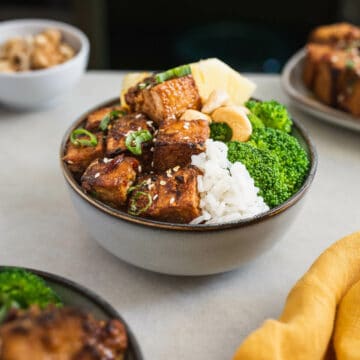The Best Vegan Protein Sources You Should Include in Your Diet
Protein is an essential building block for maintaining muscle health, supporting immunity, and boosting overall vitality. For those embracing a plant-based lifestyle, meeting daily protein needs might seem challenging, but the truth is that a vegan diet can offer a diverse array of nutrient-dense, high-protein foods. 
These options not only match but often surpass traditional protein sources in health benefits and sustainability. Here’s a closer look at the best vegan protein sources to enhance your diet.
Legumes: Nature’s Protein Powerhouse
Legumes are foundational in vegan diets due to their rich protein and fiber content. Offering a balance of macronutrients and essential amino acids, legumes contribute significantly to a plant-based diet's nutritional value.
- Lentils: Containing around 18 grams of protein per cup, cooked lentils are versatile and easy to incorporate into soups, salads, and curries. They also supply essential minerals like iron and folate.
- Chickpeas: With 15 grams of protein per cup, chickpeas (and their popular derivative, hummus) are excellent for snacks, main dishes, or dips.
- Black Beans: Packing 15 grams of protein per cup, black beans shine in burritos, veggie burgers, or chili recipes.
Benefits of Including Legumes
- High in dietary fiber for digestive health.
- Rich in essential vitamins and minerals, including magnesium and potassium.
- Low in fat and cholesterol-free.
Learn more about legume nutrition
Soy-Based Products: The Protein Power Players
Soy-based foods are among the most reliable and complete protein sources for vegans. They contain all nine essential amino acids, making them a perfect substitute for animal-derived protein.
- Tofu: This adaptable ingredient offers 10 grams of protein per half-cup and can be grilled, baked, or blended into smoothies.
- Tempeh: With 15 grams of protein per half-cup, tempeh is a fermented soy product with a nutty flavor that pairs well with stir-fries or sandwiches.
- Edamame: Young soybeans, or edamame, boast 17 grams of protein per cup and make a delicious, protein-rich snack or salad topping.
Why Choose Soy-Based Proteins?
- Versatile for a variety of dishes.
- High in isoflavones, compounds linked to heart health and hormonal balance.
- Contains calcium and iron, supporting bone and blood health.
Explore soy protein options
Whole Grains and Pseudograins
Grains may not be the first thing that comes to mind when considering protein, but many whole grains and pseudograins are surprisingly protein-rich and nutritionally dense.
- Quinoa: Technically a seed, quinoa is a complete protein with 8 grams per cooked cup. Its nutty flavor and fluffy texture make it ideal for salads, bowls, or breakfast porridge.
- Farro: This ancient grain provides 6 grams of protein per cup and offers a chewy texture that’s perfect in soups or roasted vegetable dishes.
- Oats: With 6 grams of protein per half-cup serving, oats make a hearty, energy-packed breakfast when combined with plant-based milk, fruits, and nuts.
Additional Benefits of Grains
- Rich in dietary fiber, aiding digestion and heart health.
- Contains essential micronutrients like B vitamins, zinc, and magnesium.
- Easily accessible and budget-friendly.
Nuts, Seeds, and Butters
These nutrient-dense snacks pack an impressive amount of protein into small servings while offering healthy fats and essential minerals.
- Almonds and Almond Butter: Almonds offer 6 grams of protein per ounce, and almond butter serves as a creamy, protein-rich spread for toast or smoothies.
- Chia Seeds: Just two tablespoons of chia seeds provide 5 grams of protein, along with omega-3 fatty acids and a wealth of antioxidants.
- Pumpkin Seeds: With 7 grams of protein per ounce, pumpkin seeds are excellent for adding crunch to salads or enjoying as a snack.
How to Use Nuts and Seeds Effectively
- Blend them into smoothies or use them as toppings for oatmeal and desserts.
- Incorporate them into homemade granola bars or trail mixes.
- Use nut and seed butters as an alternative to dairy spreads.
Tips for Building a Protein-Rich Vegan Diet
- Combine Complementary Proteins: Pairing grains with legumes (e.g., rice and beans) ensures a complete amino acid profile.
- Plan Your Meals: Pre-planning ensures your daily protein needs are met efficiently.
- Supplement with Protein Powders: When necessary, consider plant-based protein powders made from sources like pea, hemp, or brown rice protein.
Summary
Including a diverse range of these protein-rich foods can help you maintain a balanced, satisfying, and nutrient-packed vegan diet. With so many delicious options, achieving your protein goals on a plant-based diet is simpler than ever.








































![[ℕ𝕖𝕧𝕖𝕣] 𝕊𝕖𝕝𝕝 𝕐𝕠𝕦𝕣 𝔹𝕚𝕥𝕔𝕠𝕚𝕟 - And Now What.... Pray To The God Of Hopium?](https://cdn.bulbapp.io/frontend/images/79e7827b-c644-4853-b048-a9601a8a8da7/1)
















